|
Ssu-Yueh Lu, the winner of the first Community Empowerment Awards - Community Empowerment Contribution Award in 2022, moved to and resided in Shigang, Taichung after the devastating earthquake of 1999. There, his life took a big turn, establishing a close bond with the local community. Mr. Lu founded the "Shigang’s Home Reconstruction Workshop" which later transformed into the "Shigang’s Home Reconstruction Association," jointly established the "Association of Community-Activist in Taiwan" with civil rebuilding teams in Central Taiwan, and led youth members to discover, experiment, and design the frameworks and blueprints for rebuilding earthquake-stricken communities. For more than 2 decades, he has been devoted to many public affairs and co-founded the "Taiwan Community Alliance," through which his influence and efforts have extended to all corners of Taiwan’s community development.
The Turning Point: From Social Movement to Community Empowerment
Mr. Lu describes himself as a person who has a passion for reading, someone who likes to think and is not afraid to stand up to regulations or authorities. During his college years, he wrote poems and organized an inter-college Classical Chinese Poetry Club. Inspired by the Modern Poetry Polemic and Nativist Literature Debate in the 1970s, he followed the trend of reflecting the reality of Taiwan in literary works. Later, he started reading Tang-Wai Magazine and participated in "outside the party" election campaigns. During his service as a junior high school teacher, he led his students to participate in the Lukang Residents' Anti-DuPont Movement. Later, in the 1980s he turned from an educator to an advocate of social issues. He immersed himself in social movements regarding environmental protection, labor and farmers' rights, and homelessness. In the 1990s, he worked as a journalist, founded a film production company, and assisted in the promotion of community building-related policies established by the Executive Yuan's Council for Cultural Affairs (now Ministry of Culture) when serving as director at then Legislator Wang Tuoh’s Office. After that, he worked with the Assignment Theatre in rural areas and indigenous communities to implement the concept of the People's Theatre Project. His years of work experience have gradually furthered his connection with community affairs.
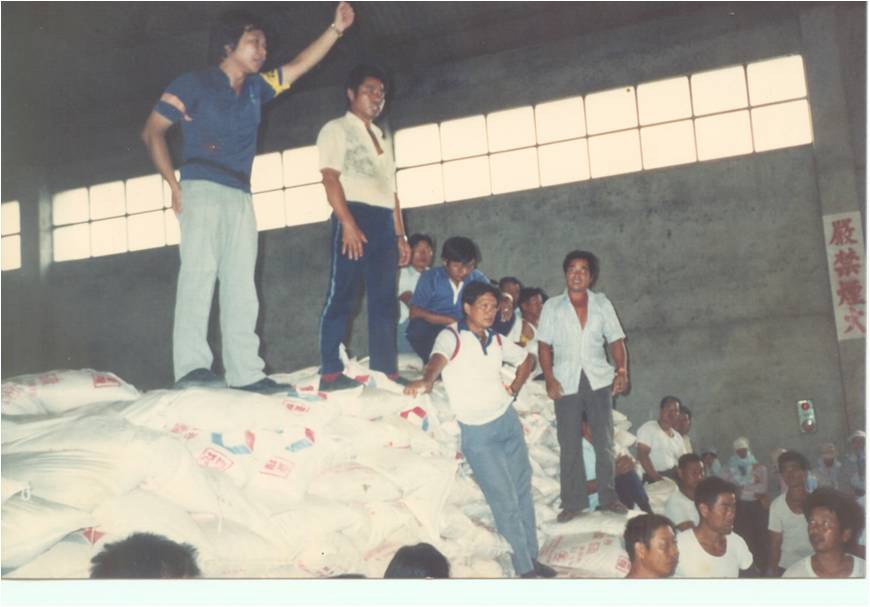
In 1988, he also supported the strike of the Port of Taichung’s porters to fight for their rights in the Labor Standards Act. (Image Source: Ssu-Yueh Lu)
In 1998, Mr. Lu quit his job at the then Legislator Wang Tuoh’s Office and joined a non-profit organization. In the same year, Lu encountered a life-changing predicament, which inspired him to compose the poem Shijian Santie (Three Moments on the Path to Practice). He said, "In my early participations in social movements, I was seethed with indignation. I saw mountains not as mountains, and rivers as not rivers. After some bumps, I steered to a more peaceful approach to encourage the public’s participation in civil society. I wrote this poem at the age of 39, at the juncture of my life, not knowing that fate would bring me to the frontline of the disaster area rebuilding tasks after the 921 Earthquake the following year. The once young poet, now turning middle-aged, encapsulated in his poem his romanticism, pragmatism, and practices, declaring a new phase in his life where he now saw mountains as mountains, and rivers as rivers.
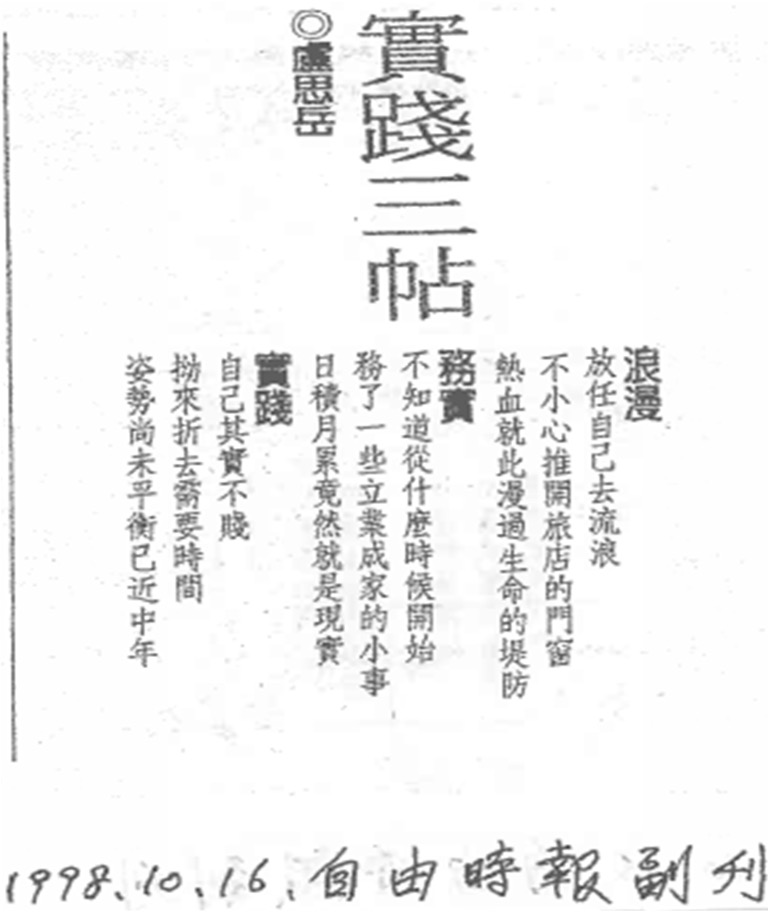
Shijian Santie, Published in Liberty Times’ Supplement on October 16, 1998 (Image Source:
Ssu-Yueh Lu)
Born from the Rubble: Rebuilding Earthquake-Stricken Areas
In 1999, Mr. Lu coordinated the "Return of the Shell-Less Snails Movement on Zhongxiao E. Road." Shortly after the event, the 921 Earthquake struck Taiwan ruthlessly. Mr. Lu, as an executive committee member of the Snails Without Shells Alliance, led young volunteers who participated in the movement to the disaster area of Shigang District in Taichung. The devastating earthquake not only shook up Taiwanese people's future, but also the life of 40-year-old Ssu-Yueh Lu, who settled in Shigang with his family, becoming local residents.
The 921 Earthquake destroyed residents’ houses, livelihood, production, natural environment, and culture. Mr. Lu mentioned, "Rebuilding and community work needed immediate actions, and rebuilding should not only be stacking back the bricks and concrete. We have to take into consideration the long-term development of the community, and that’s why we were often torn between priorities and had to keep looking for solutions." As the rebuilding process after the 921 Earthquake encompassed an array of issues, including cultural transmission, ecosystem conservation, social welfare, and spatial planning, it triggered the incorporation of the "Community Enterprise Project" into community empowerment. At the same time, Mr. Lu started to connect with civil rebuilding teams of disaster-stricken areas and founded the "Association of Community-Activist in Taiwan." He said, "I was involved in a larger geographical area and to a greater extent. By doing so, I was able to promote community empowerment and help gather feedback from the people and collectively talk and negotiate with the government regarding the amendment or formulation of suitable policies." Under the pressure of the urgent need for rebuilding, civil rebuilding teams and all levels of government put forth many innovative ideas to respond to the needs of the community. Mr. Lu mentioned that ideas such as the now-well-known community care service stations started being implemented as pilot projects during the rebuilding process. In addition, the 6 pillars—cultural education, environment and landscape, ecosystem conservation, industrial development, social welfare and medical care, and community safety—of the "Taiwan Healthy Community 6-Star Plan" proposed by the Executive Yuan were concluded from the post-disaster reconstruction experiences. "You can say that all levels of community building, from theory to practice, were born and gradually shaped from the harrowing post-921-earthquake rebuilding experience, in other words, they were born from the rubble."
Extending the Influence, Establishing the "Empowerment Guidance Mechanism," and Founding the "Taiwan Community Alliance"
Extending this influence from earthquake-stricken areas to all corners of Taiwan, the Association of Community-Activists in Taiwan also jointly deliberated with scholars and experts of post-disaster rebuilding efforts and the 921 Earthquake Post-Disaster Recover Commission, Executive Yuan on relevant policies that facilitated the establishment of 4 "community empowerment centers" by the Council for Cultural Affairs in reconstructed and non-reconstructed areas in 2002. The centers trained local talents, guided them to implement proposals, and carried out other tasks, altering the past practice of "outsourcing" such projects to universities or professional organizations. As community empowerment centers upgraded to the municipal or county (city) level, the ministries and commissions under the Executive Yuan followed suit, included intermediate organizations in community empowerment-related policies, and rolled out the "empowerment guidance mechanism," a sustainable development policy. This arduous path that Mr. Lu and his team treaded and experimented on from the beginning has borne fruit. He smiled and said, "The greatest success is that the tasks that many communities once thought to be impossible are now being carried out in thousands of communities around Taiwan, writing proposals and receiving subsidies."
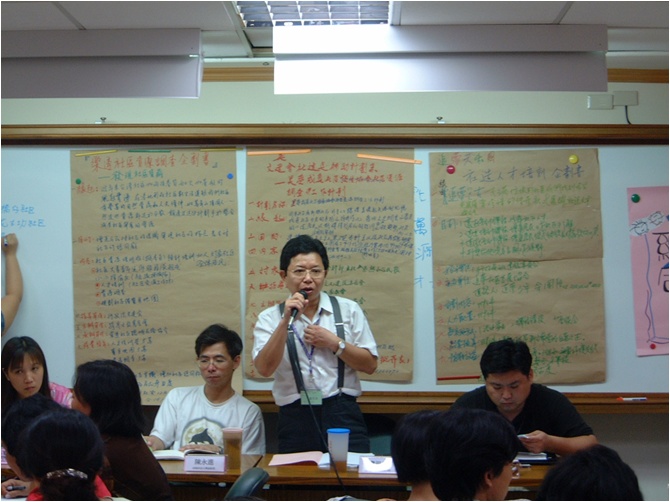
2002 Community Empowerment Training - Feedback for Group Workshop Presentations (Image Source: Ssu-Yueh Lu)
In 2006, instructors from the 4 experimental community empowerment centers, Chia-Hung Hsiang, Ssu-Yueh Lu, Jui-Kun Kuo, and Tien-Hung Lin, in Northern, Central, Southern, and Eastern Taiwan, respectively, founded the "Taiwan Community Alliance," connecting nearly 200 communities with basic potential for community empowerment and more than 800 community staff members, counselors, and assistant counselors. "At that time, we wanted to gather more public influence to communicate with the government, allowing us to provide feedback, suggestions, and adjustments to strategies." That year was also the year when the 921 Earthquake Post-Disaster Recover Commission was dismissed and the time to start community empowerment. The government’s promotion of community empowerment has extended from a project of the Council for Cultural Affairs to the participation of 13 ministries and commissions. The timely establishment of the "Taiwan Community Alliance" that gathered the collective force of communities has become an important milestone in the history of Taiwan’s community empowerment. This fully illustrated that although community empowerment policies are proposed by the government, they require the involvement of the civil sector, including practice, reflection, analysis, and feedback from grassroots communities, civil organizations, experts, and scholars. Only by implementing "rolling adjustments" can we gradually enrich the meaning of civil society.
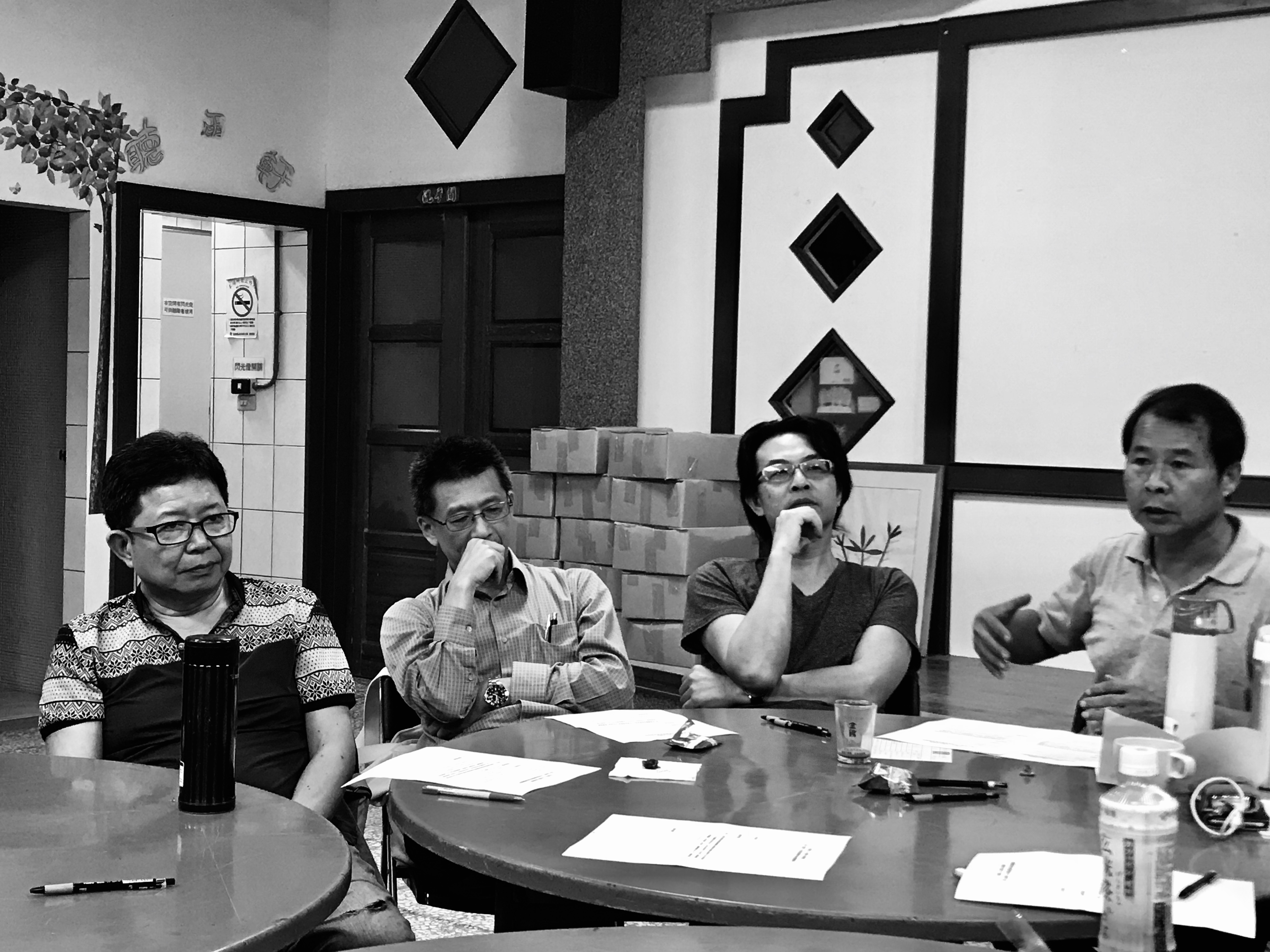
The 4 Founders of the Taiwan Community Alliance in a Meeting, Photograph Taken in 2018; From Left to Right: Ssu-Yueh Lu, Jui-Kun Kuo, Chia-Hung Hsiang, and Tien-Hung Lin (Image Source: Ssu-Yueh Lu)
Allowing District Offices to be the Main Support for Community Empowerment
Mr. Lu, who currently resides in Shigang, Taichung, is also an important promoter of administrative community empowerment of the district offices in Taichung. Taichung adopted the Ministry of Culture’s administrative community empowerment policy, and established Taiwan’s first "Community Empowerment Consultation and Promotion Office," in order to actively involve the township district offices in community empowerment affairs, which had long been lagging. By doing so, the government could eliminate the paradox where district offices, being the grassroots administrative offices, were oftentimes overlooked by the central or city/county governments’ plans or budget allocations, and were unaware of the community empowerment plans carried out in their jurisdiction. In 2011, Mr. Lu led a team from the Wuxiang Workshop to provide consultation for district offices in Taichung. They provided training for small counseling teams of the district offices with the know-how of community empowerment, established the overall environment and framework for administrative community empowerment, and assisted the Taichung City government to obtain more resources from the Ministry of Culture. He explained, "We started from the plan of ‘One District One Feature,’ and in 2016, we experimented it first in 4 district offices, then 15, and then 18. By 2021, we had set up 26 community empower centers in 29 district offices, gradually transforming district offices into companions, counselors, and empowerment facilitators of grassroots communities."
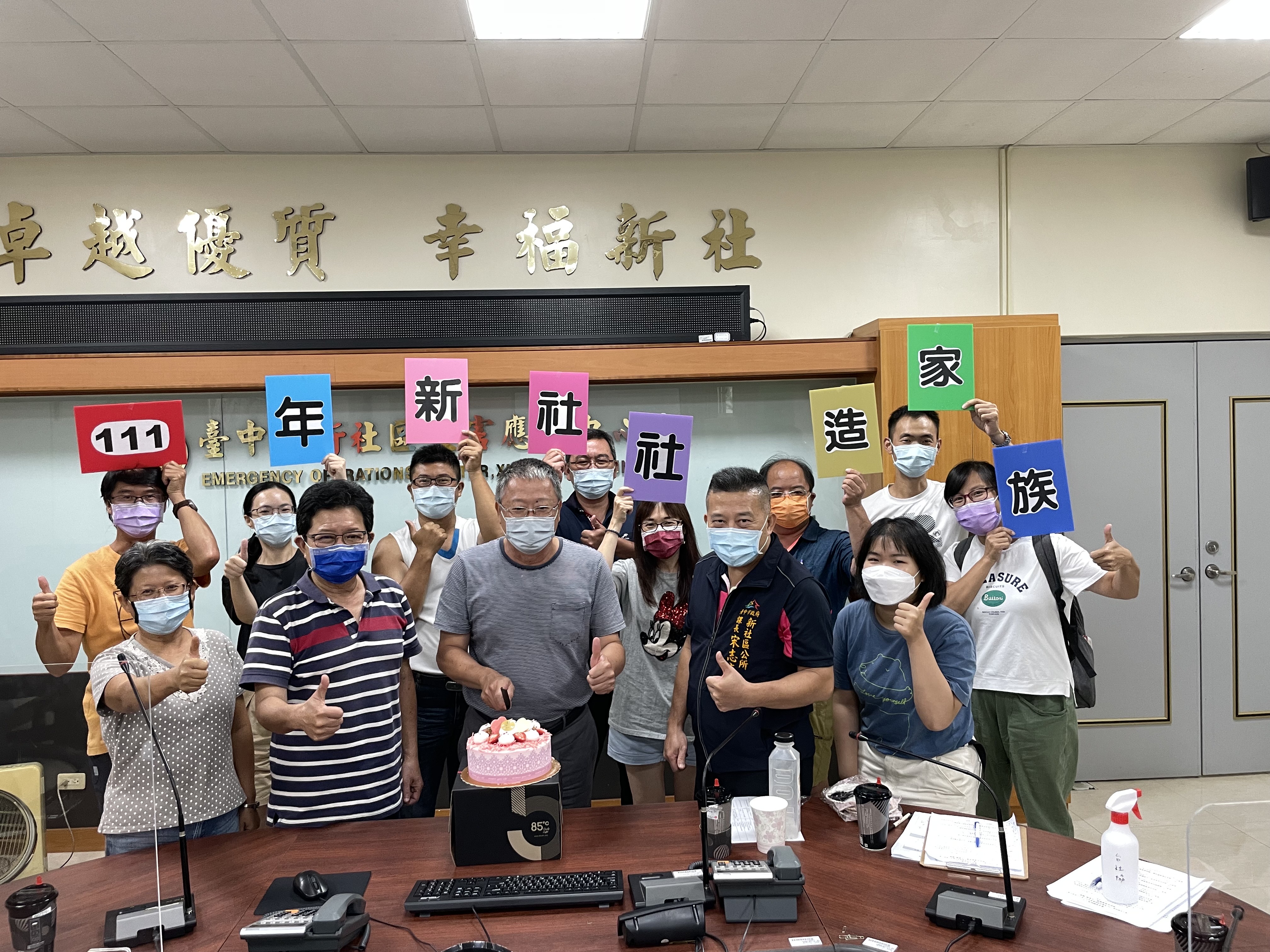
Assisting the Establishment of the Community Empowerment Team of the Xinshe District Office in 2022 (Image Source: Ssu-Yueh Lu)
The Road Ahead: Joint Cooperation, Youth Training, Cross-Strait Community Empowerment Communication, and Continued Transformation
Over the years, the "Taiwan Community Alliance" has trained talents, advocated awareness, and carried out policy dialogs and exchanges through community empowerment leadership schools, youth community empowerment camps, the Sixth Graders’ Community Empowerment Forum, Community Empowerment and Grassroots Democracy Forum, Community Empowerment 4.0 Workshop, National Community Empowerment Conference, and others. The 4 founders, nicknamed the "Community Empowerment F4," have handed over the baton to sixth and seventh graders. Lu said, "In the future, I want to further my work in the Alliance. First, we will work with community empowerment organizations in Taiwan with civil society as our goal, continue to communicate with the government, and provide assistance to make adjustments on a rolling basis to community empowerment policies. Second, we will focus on youth training, hand over all our work, and work on the civil society handover to the youth and communities. Last but not least, we will encourage cross-strait communication regarding community empowerment and community governance, to demonstrate our mutual efforts to the civil sector, so as to promote peaceful development of cross-strait relations." Currently, the people of Taiwan are less exposed to interactions with the civil society of the People’s Republic of China.
Mr. Lu also mentioned that he has often been invited to lectures, training, and visits in China, and he has many times planned visiting tours and received community empowerment visitor groups from China. Many of China’s current community empowerment plans are based on Taiwan’s decade-long experiences and strategies. Most of the community empowerment organizations in China and Taiwan are focused on disadvantaged grassroots communities. Mr. Lu anticipates that apart from political and economic communications, social exchanges can help more people see the efforts invested in community life and community empowerment in both China and Taiwan, and this act of "seeing each other" will be a valuable foundation for peace.
From his experience in social movements to community empowerment, Mr. Lu believes that only through changing the community and the people can we achieve a civil society. Although community empowerment, an important means toward civil society, has its limitations compared to social movements, it is an immediate and peaceful social movement that exists in everyone’s daily life, and a positive way to encourage more public involvement in civil society. As the Taiwan Community Alliance mentioned in its 2008 Community Empowerment Manifesto: "Community empowerment extends from community development to social reform." This never-ending movement requires continued recruitment of new blood and needs to adjust its contents and practices based on the evolution of time. From a leader, advocate, communicator, to a trainer of uncountable community empowerment talents, Mr. Lu, now handing over the baton to the next generation, has played different roles but always toward the same goal.
About Ssu-Yueh Lu:
Current CEO of Wuxiang Workshop and Director of the Taiwan Regional Revitalization Foundation Former Founding Chairman of the Association of Community-Activist in Taiwan, 5th and 6th Term Chairman of the Taiwan Community Alliance, Deputy Secretary-General of the General Assembly of Chinese Culture, member of Community Empowerment Promotion Committees in Taichung, Taoyuan, Changhua, Miaoli, Nantou, Chiayi, and other cities, and judge panel member of the We Are One Project - Community Empowerment Action Plan of Sinyi Realty Inc from 2004 to 2023. Awards: 921 Earthquake Civil Reconstruction Contribution Award by the Executive Yuan in 2002, third Hakka Journalism Award - Analysis Award by the Hakka Affairs Council, Executive Yuan in 2008, first Community Empowerment Awards - Community Empowerment Contribution Award by the Ministry of Culture in 2022.
(Interview Editor: Ling-Ying Huang)
Reviewed by: Ssu-Yueh Lu
Authorization in this article:CC3.0 BY-NC-SA
|








